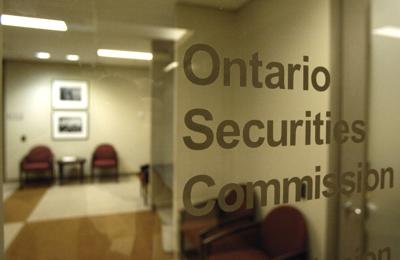A significant proportion of mutual fund salespeople working for Canada’s Big Five banks say they feel pressure to hit sales targets by selling customers ill-suited investments and products they simply donÔÇÖt need, according to a survey done by regulators.
The survey,┬ádone by the Ontario Securities Commission and the Canadian Investment Regulatory Organization, found that 40 per cent of the salespeople said that internal “scorecards” have influenced their decisions on what services or products to offer clients.
That, said the OSC’s Sonny Randhawa, is a problem.
“It’s concerning,” said Randhawa, the OSC’s executive vice president of regulatory operations. “It’s a red flag if ... recommendations for products and services are not being made in the best interest of clients, but rather to satisfy some type of internal performance measure.”
Going directly to sales staff on the front lines to get their sense of the dynamics was vital to understanding the issues, said Randhawa.
“It was really intended to give us a clear line of sight into whatÔÇÖs the environment, whatÔÇÖs the sales pressure, what range of products reps view on their shelves, and what’s the reps’ knowledge,” said Randhawa.
The survey of 2,863 mutual fund salespeople was sparked by a CBC Marketplace investigation which found mutual fund salespeople at Canadian banks used high-pressure sales tactics which led to unsuitable investments being recommended.
In an emailed statement, the Canadian Bankers Association said its members would be reviewing the results of the survey, and are committed to ensuring customers get “needs-based” advice.
“Banks and their employees prioritize consumer and investor protection measures and strive to put customer interests at the centre of all product and service recommendations,” the CBA said. “CanadaÔÇÖs banks value and invest in collaboration with regulators, an approach that is fundamental to a robust, stable, and innovative financial sector that serves the interests of Canadian consumers, investors and the broader economy.ÔÇŁ
While there are other ways for people to buy mutual funds, there’s no denying that the Big Five banks┬áÔÇö RBC, TD, BMO, Scotiabank and CIBC┬áÔÇö are major players, making it all the more crucial for regulators like the OSC and self-regulatory groups like CIRO to keep an eye on their sales practices, said Randhawa.
“The interactions with with bank branch representatives is a pretty core way for Canadians and Ontarians to explore their financial options and get advice,” said Randhawa. “So the focus of these bank reps should really be on the best interests of the clients and customers during these interactions and any potential conflicts of interest arising from sales practices should be managed.”
The Big Five banks have other 5,000 branches across the country, according to industry statistics.
Almost half of survey participants, 44 per cent, said they feared losing their jobs if they didn’t meet┬ásales, revenue, client or asset targets.
The survey also found that 32 per cent of salespeople found that the way they’re compensated places more value on sales volume than quality of advice given to clients.
Participants said an average of 10 per cent of their pay was tied to sales performance, although it ranged as high as 20 per cent for more senior salespeople. One participant in the survey criticized the basic conflict between inherent in tying sales performance to compensation.
“There needs to be an overhaul in this industry that puts the clients’ needs first above the bankÔÇÖs targets and goals,” the salesperson said. “There is a paradox in providing financial advice and tying compensation to how much you can sell. This comes from the top.ÔÇŁ
That paradox creates anxiety for both sides of the sales equation, another survey participant said.
ÔÇťI feel pressured at work to make sales that arenÔÇÖt always suitable for my client. This needs to change, as the practices in place are creating unease and anxiety for myself and clients,” the salesperson said.
The next stage for both the OSC and CIRO, said Randhawa, is taking a closer look at banks’ internal “scorecards” for salespeople. though he declined to give a precise description of how and when that will take place.
EditorÔÇÖs note┬áÔÇö July 9, 2025
This story has been updated to add a comment from the Canadian Bankers Association.



























To join the conversation set a first and last name in your user profile.
Sign in or register for free to join the Conversation